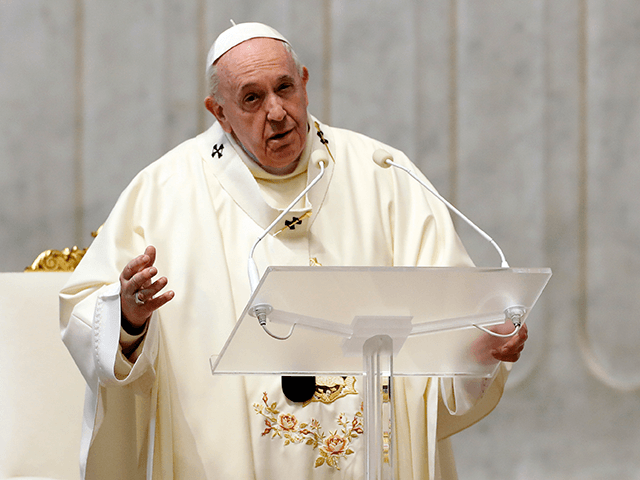ROME — Pope Francis said Wednesday that there are only two masters in the world: God and money, and every person must choose which of the two to serve.
In his weekly General Audience, the pope reflected on Saint Matthew’s Gospel account of Christ’s resurrection, especially on how the Roman guards were paid off not to tell anyone that Jesus had risen from the dead.
“I would like to pause at this point: the guards, the soldiers, who were in the tomb to prevent the disciples from coming and taking his body, they saw him; they saw him alive and risen,” Francis said. “His enemies saw him, and then they pretended not to have seen him. Why? Because they were paid.”
The full text of the relevant biblical account is this:
While they were going, some of the guard went into the city and told the chief priests everything that had happened. After the priests had assembled with the elders, they devised a plan to give a large sum of money to the soldiers, telling them, “You must say, ‘His disciples came by night and stole him away while we were asleep.’ If this comes to the governor’s ears, we will satisfy him and keep you out of trouble.” So they took the money and did as they were directed. And this story is still told among the Jews to this day. (Matthew 28:11-15)
In Wednesday’s address, the pope highlighted the bribery of the soldiers to underscore the evil of money.
“Here is the true mystery of what Jesus once said: ‘There are two masters in the world, two, no more: two. God and money. He who serves money is against God,’” Francis asserted in his interpretation of Jesus’s teaching that no one can serve two masters.
“And here it is money that changed reality,” he continued. “They had seen the wonder of the resurrection, but they were paid to keep quiet.”
The pope went on to propose that this scenario is repeated in history when Christians are paid off not to do their duty.
“Think of the many times that Christian men and women have been paid not to acknowledge in practice the resurrection of Christ and did not do what Christ asked us to do as Christians,” he said.
Pope Francis has often criticized the economy, calling money “dishonest wealth” and also “the devil’s dung.”
Speaking in Saint Peter’s Square in the Vatican in 2019, the pontiff told pilgrims and visitors to beware of riches.
Referring a gospel parable in which Jesus speaks of “dishonest wealth,” the pope declared: “‘Dishonest wealth’ is money, also called ‘the devil’s dung,’ and in general, material goods.”
“Wealth can drive people to erect walls, create divisions, and discriminate,” Francis continued.
“Jesus, on the contrary, invites his disciples to change course: ‘Make friends with riches,’” he said. “It is an invitation to learn how to transform goods and riches into relationships, because people are worth more than things and count more than the wealth they possess.”
Sunday’s speech was not the first time that Pope Francis has used colorful language in speaking about money, or even for the reference to “the devil’s dung,” a quotation from Saint Basil the Great.
“It is not easy to talk about money,” Francis said in an address to the Italian Confederation of Cooperatives in 2015. “Money is the devil’s dung! When money becomes an idol, it rules over a person’s choices. And then it ruins a person and condemns him, turning him into a slave.”
Likewise, in a homily given in 2013, the pope used the same expression to decry wealth.
“Money becomes an idol and you worship it. This is why Jesus tells us: ‘You cannot serve the idol of money and the living God.’ Either one or the other.”
Here, too, Francis called money “the devil’s dung,” insisting that “it turns us into idolaters, sickens our mind with pride and makes us enthusiasts of frivolous things that pull us away from the faith.”

COMMENTS
Please let us know if you're having issues with commenting.